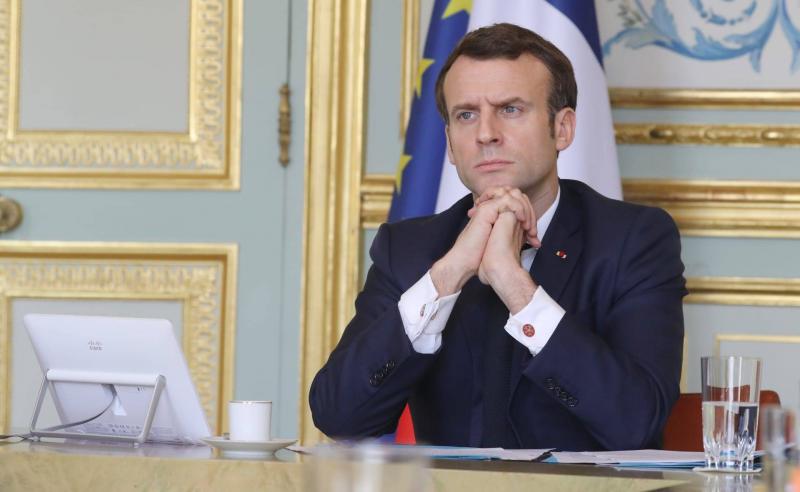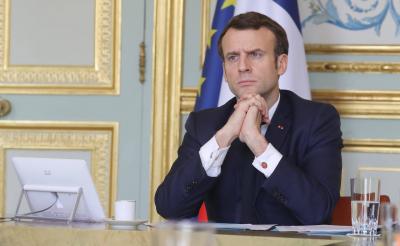European diplomatic sources in Paris believe that since the outbreak of the Gaza war, Western focus has been, alongside reaffirming support for Israel and its "legitimate right to self-defense," on preventing its expansion to other fronts, particularly the Lebanese front, as reported by "Asharq Al-Awsat." Warnings have escalated against slipping into a wide-reaching war, which Washington has sought to avoid through the deployment of aircraft carriers, submarines, and a group of accompanying warships to the Mediterranean waters off the Israeli and Lebanese coasts, an act considered a deterrent message to Hezbollah.
It is likely that the Western concern did not stem from fear for crisis-ridden Lebanon but from preventing the Israeli forces from being distracted and forced to fight on two fronts. However, the military buildup and political and diplomatic warnings did not prevent a "partial" and daily escalation on the mentioned front, albeit within the rules of engagement adhered to between the Israeli army and Hezbollah. The increase in skirmishes has prompted the United States, particularly France, to intensify efforts aimed at diffusing military escalation by fully implementing the provisions of UN Security Council Resolution 1701 issued in August 2006, specifically its eighth clause, which mandates the disarmament of the area from the border to the Litani River, excluding the Lebanese army and UNIFIL forces.
Israel has exerted significant pressure, as stated by senior officials, including Defense Minister Yoav Gallant, who promised to push Hezbollah forces out of the specified area diplomatically if possible and through force if not. Hezbollah officially ties its retention of weapons and forces to the continued Israeli occupation of Lebanese territories (Kfarshouba, Shebaa Farms, and the northern part of Ghajar), and the correction of the 13 disputed border points along the blue line drawn by the United Nations. Therefore, the American-French approach, according to the aforementioned sources, sees that overcoming the risks of an explosive situation passes through establishing an appropriate mechanism for implementing and respecting Resolution 1701, which is the responsibility of both parties, Israel and Hezbollah, through diplomatic efforts, removing Hezbollah's rationale, and halting Israeli violations of the aforementioned resolution. Lebanese Foreign Minister Abdullah Bou Habib has previously confirmed that Israel has violated Resolution 1701 30,000 times since 2006.
In this context, France's attempts are highlighted, having begun by sending Foreign Minister Catherine Colonna to Lebanon on October 16, carrying messages warning of Israeli actions, followed by Jean-Yves Le Drian, the special representative of President Macron to Beirut, with Minister of Defense Sébastien Lecornu shortly returning to Paris and concurrently arriving in the Lebanese capital was Bernard Émié, the former ambassador to Lebanon and director of the French external intelligence. The latest visit to Lebanon last week was by a joint diplomatic-defense delegation led by Frédéric Mondoloni, the director general of political and security affairs at the Ministry of Foreign Affairs, who arrived in Beirut after a visit to Israel.
During President Emmanuel Macron's participation in the COP 28 climate summit in Dubai, he met Lebanese Prime Minister Najib Mikati, with the border issue with Israel at the forefront of the discussed topics. Sources familiar with the situation in Paris confirm that there is French-American coordination towards the same goal. However, Paris appears to be more engaged in diplomatic efforts than it is capable of influencing the concerned parties. With Minister Colonna's visit to Beirut at the end of this week and the now almost confirmed visit of President Macron to Lebanon on the 21st and 22nd of this month, supposedly to meet the French battalion operating under UNIFIL (the international force in southern Lebanon), French diplomacy seems to have elevated its level of communication and accelerated its pace.
Notably, on Tuesday evening, an announcement was made to the press by the Élysée Palace, indicating Macron's visit to an unspecified destination, warning journalists that to obtain visas, they must present passports free of Israeli stamps, strongly indicating that Macron's destination is Lebanon, a fact confirmed by independent sources to "Asharq Al-Awsat." It is known that Lebanon is still officially at war with Israel, and entry is prohibited for those who have visited Israel.
The question surrounding Macron's visit pertains to what new proposals he carries to "venture" into a country that has caused him many disappointments over the past three years. European diplomatic sources assert that what is certain is Paris' desire to mediate in a file it believes it has the capability to influence, unlike the ongoing war in Gaza. It has now become common knowledge that the demand to amend the text of Resolution 1701 has fallen by the wayside, and what is now sought is its implementation as is. Additionally, efforts to settle the Lebanese-Israeli border issue seem illusory, distancing them from the outcomes of the ongoing war in Gaza due to the interlinkage of the two fronts.
Despite ideas that Paris may have formulated, including increasing UNIFIL troops and the required reciprocal steps from the Lebanese state, Hezbollah, and Israel, as well as a model mechanism to be adopted—such as placing the villages and lands Lebanon seeks to reclaim under temporary international oversight until their fate is determined along with other uncertain proposals—executing them requires mediation beyond France's capabilities. Many perceive it as difficult to exclude Iran from the equation, necessitating engagement with it. Moreover, Israel demands prior guarantees before accepting any territorial concessions, and France does not seem able to provide such guarantees.
Furthermore, it is difficult to envision an agreement that does not have American backing and support. The U.S. energy advisor to the president, Amos Hochstein, the architect of the maritime border agreement between Lebanon and Israel, had shyly offered his services and visited Beirut last month for this purpose, but his efforts did not continue.
What is certain today is that Paris, Washington, and European capitals want to prioritize diplomatic avenues, which Lebanon and part of the Israeli authorities seek, while another segment, particularly army generals, believe that a war with Hezbollah will occur, whether today or tomorrow. Thus, the role Paris seeks to play could be beneficial, though not sufficient, as it may help clarify the picture of the solution and the obstacles it faces while awaiting broader engagement from influential parties, which is directly related to the outcomes of the Gaza war.




